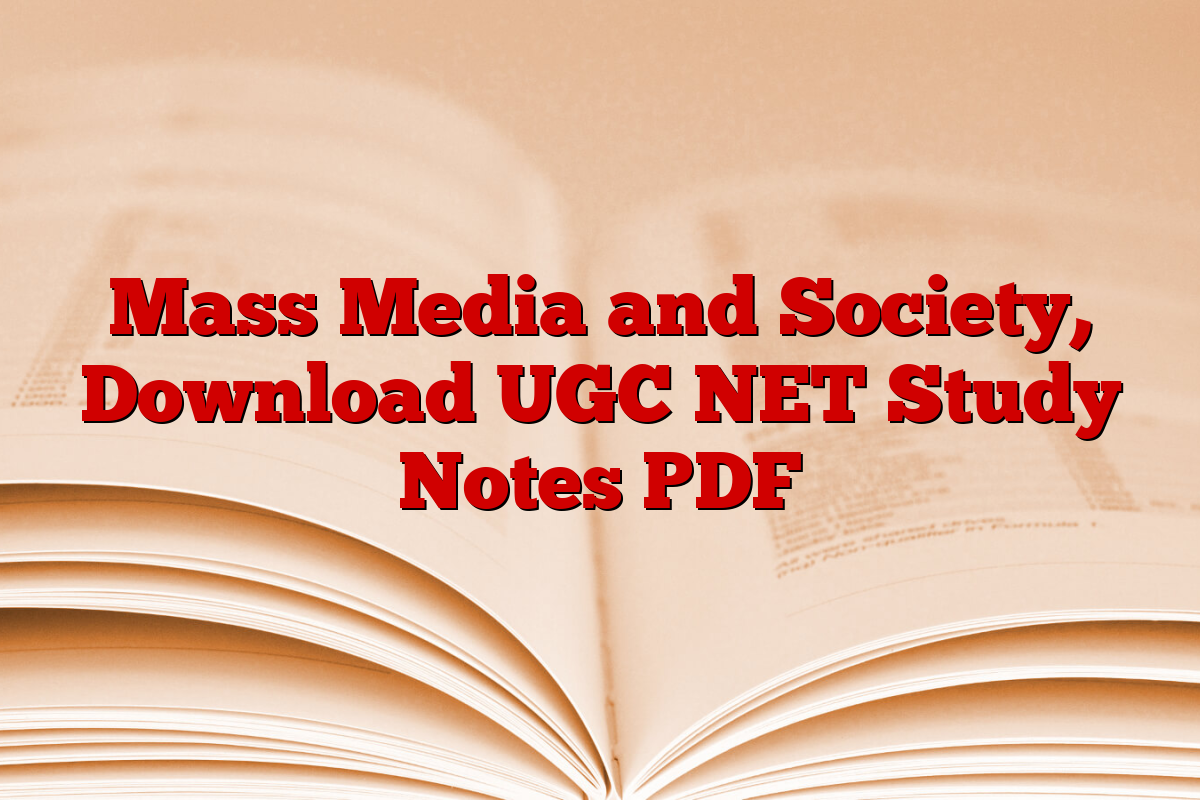Mass media hold an important place in contemporary society, serving as a powerful means for communication and distribution of information. Its wide reach and significant influence affect many aspects of our daily lives, shaping our thoughts and inspiring social changes. In this article, we will take a deeper look at the complex intersection between mass media and society, examining its impact on culture, politics, the economy, and individual behavior, as well as exploring the diverse range of mass media available today.
UGC NET Study Notes for Paper 1
communication media
Mass media refers to various forms of communication that simultaneously reach large audiences. This includes mediums such as television, radio, newspapers, magazines, the Internet and social media platforms. Mass media play an important role in shaping public opinion, disseminating information and influencing social, cultural and political trends.
type of mass media
It is important to have an in-depth knowledge of the different types of mass media in understanding the prevalence and impact of mass media on individuals and society.
1. Print media
Print media, like newspapers, magazines and books, remains relevant despite the digital age. It provides extensive news coverage, features and literary works. Its tangible format provides a reliable and immersive reading experience that many people still value.
2. Broadcast media
Broadcast media such as radio and television reach wide audiences and shape public opinion. They provide news, music, talk shows and entertainment. Although digital platforms have had an impact on them, they still hold influence over a significant portion of the population, creating cultural phenomena and fueling the national conversation.
3. Digital Media
The Internet revolutionized mass media by bringing digital platforms. Websites, online news and blogs provide real-time information with interactive features. Social media platforms such as Facebook, Twitter, and Instagram allow extensive content sharing and discussion.
4. Social Media
Social media platforms like Facebook, Twitter and Instagram exert significant influence. They connect people, facilitate content sharing and enable real-time discussions. News consumption has changed with personalized information feeds and active participation in conversations.
Mass media and society
Mass media have a profound impact on society, shaping opinions, disseminating information, and influencing cultural norms. The complex relationship between mass media and society, highlighting its impact is as follows:
-
cultural influence
- Mass media shape cultural norms and values through platforms such as television, film, music, literature, and the Internet. It presents new ideas, challenges stereotypes and promotes inclusivity.
- Diverse portrayals of ethnicities, gender roles, and social issues challenge existing norms, while cultural exchanges promote intercultural understanding. Mass media act as a mirror, reflecting and influencing social values, and shaping cultural identity.
-
political influence
- The mass media are vital to democracy, acting as a watchdog and facilitating public discussion. Through news outlets, investigative journalism, and social media, it informs citizens, encourages participation, and holds officials accountable.
- However, media bias and sensationalism can polarize public opinion. The rise of social media amplifies these effects, influencing elections and public sentiment through the rapid spread of both accurate and misleading information.
-
economic implications
- Mass media boost the global economy through advertising, creating jobs, and promoting consumerism. It shapes consumer behavior, influences purchasing decisions and economic growth. TV, print, online and social media platforms contribute to its economic impact.
- The media industry generates revenue supporting a variety of businesses. The digital age has brought about new business models in response to changing preferences and technology.
-
personal behavior
- Mass media shapes individual behavior, influencing attitudes, beliefs and aspirations. It exposes people to diverse cultures and ideas, influencing self-perception and social expectations.
- However, the pervasive nature of digital media can contribute to addiction, cyberbullying, and mental health issues. Mass media platforms like TV shows, movies and social media play an important role. Nevertheless, mass media can empower individuals through education, information access, and promoting social change, promoting activism for various causes.
In conclusion, the relationship between mass media and society is dynamic and multidimensional. Mass media serves as an important communication tool, disseminating information and connecting individuals. It influences cultural norms, challenges stereotypes and promotes inclusivity. Additionally, mass media shape public opinion and political discourse, although it is important to control media bias and misinformation.
Download Mass Media and Society Studies Notes PDF
sharing is Caring!
